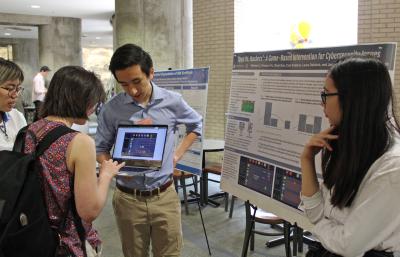HCI Students Present Research During MoM 2019

The Undergraduate Research Symposium, or the "Meeting of the Minds," (MoM) is a university-wide celebration of undergraduate research. More than 700 Carnegie Mellon University students, including several from the Human-Computer Interaction Institute, presented their research on Wednesday, May 8, in the Cohon University Center.
Conducting research is a valuable experience for CMU undergraduates and advisors alike.
For Judy Kong, it served as an important step in helping her to choose her future path -- one that now includes a research-focused 5th-year master's in computer science.
“It really helped me understand myself as in how much I like human-computer interaction (HCI) research and how well I can do in it,” said Kong. “Also, it gave me the opportunity to understand current challenges in the field, accept that there will always be limitations and I might fail sometimes, but try to build a future upon that.”
Kong presented a poster for “StateLens: A Reverse Engineering Solution to Making Existing Dynamic Touchscreens Accessible.” StateLens uses state diagrams of the touchscreens, crowdsourced labeling, conversational agents to guide blind users through tasks, and 3D printed accessories to facilitate intentional interactions.
Kong, a 2018 computer science graduate with an additional major in HCI and minors in machine learning and statistics, will continue her HCI research under the direction of Jeff Bigham, associate professor in HCI.
Advisors, including HCI Ph.D students Joseph Seering and Cori Faklaris, enjoy the process as well.
“This past summer I worked with Connie Ye, a sophomore with a double major in art and computer science, on a project developing advanced conversational chatbots. To say that the project would not be where it is without her help is an understatement,” Seering said. “She took the lead on both the creative and technical aspects of the project, and pushed the quality of the work beyond what I had hoped.”
“One of the best parts of being in the HCII has been the ability to work with such remarkable students -- over the past four years, I have worked with 17 students whose backgrounds ranged from education to computer science to design and psychology, resulting in the development of novel systems in multiple domains and the publication of several papers,” added Seering.
To prepare for the annual MoM event, the student researchers meet regularly with their advisors to get feedback on their progress. This develops students’ communication and independent thinking skills, as well as gives them the opportunity to apply the concepts they’re learning about in class.
“Each group of our mentored students produces a presentation in slides or in a poster, which pushes them to quickly summarize and document the results of their research in a way that anyone can understand,” said Faklaris. “In this way, they end their work with us with a portfolio piece that they can use in job interviews or in applying for graduate school to help demonstrate their skills. This also helps us to show our sponsors at the National Science Foundation that we are meeting our objectives for educating students as part of our overall Social Cybersecurity project.”
Faklaris co-advised three research projects in the MoM this year, including “Apps vs. Hackers: A Game-Based Intervention for Cybersecurity Issues,” a contest-based defense-attack game based on the popular “Plants vs. Zombies” designed to boost players’ knowledge of cybersecurity practices; “Safesea: A Chrome Plugin for Crowdsourcing Privacy Settings,” a browser plugin to help people more easily configure their Facebook security and privacy settings; and “Toward Predicting Users’ Security Behavior Through Contextual Smartphone Data,” which utilizes users’ actual smartphone data instead of the more traditional method of surveys to gather users’ app settings and security behaviors.
“I love working with CMU undergraduate students because they are so talented -- they help us to move forward more quickly on our project’s research thrusts by building out system prototypes and helping to run studies and analyze data. I also enjoy their energy and their questions. It reminds me of why I got interested in doing research myself -- for the fun of discovering new ideas and for the satisfaction of working through the many hurdles and dead ends,” Faklaris said.

